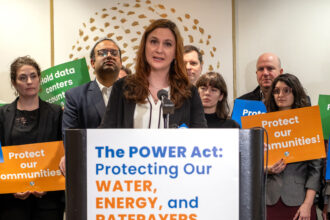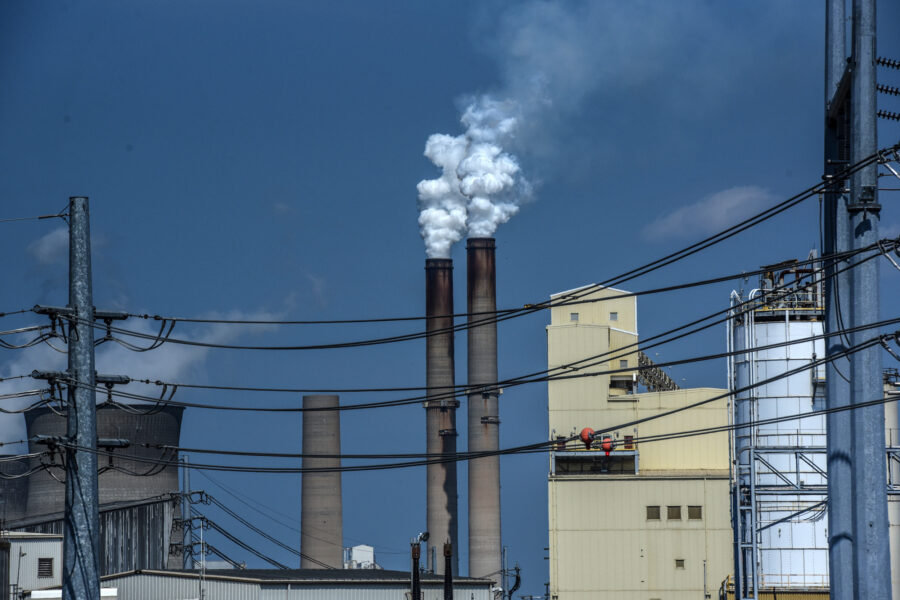Forty-four of the nation’s largest investors are urging Congress to seize the most important opportunity the nation has had in years and pass a far-reaching economic stimulus bill that funds energy efficiency, clean energy, and clean transportation.
If Congress acts now and acts wisely, private investment will follow, writes Kevin Parker, global head of Deutsche Asset Management, one of the 44.
This is not a group to be taken lightly. Together, its members represent $1.7 trillion worth of assets. They include the massive California Public Employees Retirement System (CalPERS), which is worth $174 billion alone, as well as the Florida State Treasury and the New York State Comptroller’s Office.
Mindy S. Lubber, president of Ceres and director of the Investor Network on Climate Risk, touched on some of their recommendations in her post yesterday. The group doesn’t want the federal government to start picking technology winners and losers, the way Treasury officials did with the bank bailout. Instead, it says, the stimulus plan should encourage a portfolio of technologies that will create jobs, new industries and new investment.
The immediate actions with the most potential economic upside, in the eyes of the investors, involve making the nation’s buildings, power grid, vehicles and homes more energy efficient. Investing in smart grid technology, including smart metering in homes and businesses, would clear the way for major efficiency and renewable energy improvements that could significantly cut energy waste and greenhouse gas emissions, encourage conservation, reduce the peak energy loads that force utilities to fire up additional plants, and at the same time put wind and solar power to optimal use.
"The economic downturn provides a historic opportunity for government to take charge of the fight against climate change rather being a reason to put off action," Parker said. "A ‘green’ stimulus will also have a wider effect by providing leadership for additional investment from the private sector."
In a letter to Congressional leaders, the investors urged the government to pressure lagging states by steering stimulus funds to those that adopt energy efficiency standards and emphasize efficiency over power plant expansion. To keep renewable resources on track, they urged Congress to extend the Production Tax Credit, which favors wind, geothermal and biomass projects. A study by consulting firm Navigant determined that the credits’ expiration in the past typically caused a 73 percent to 93 percent drop in new installations. That translates to fewer jobs and less investment, precisely what the stimulus plan seeks to avoid.
Our ability to continue to invest in the renewable energy and energy efficiency industries, and accelerate the growth of these industries, depends on a comprehensive and stable set of supportive policies, including the long-term extension of the PTC.
With the dire economic conditions we are facing, this is no time to fail to pass this critical legislation and thereby interrupt the greatest economic growth and job creation potential the U.S. market faces.
That’s some big money talking. Let’s hope Congress will set aside its political differences for the next few weeks and listen.
See also:
Economic Stimulus (Part I): Only 16% Green?
Economic Stimulus (Part II): Show Me the Vision
Economic Stimulus (Part III): Can the Recipients Handle It?
Video: The Economic Wisdom of a Green Recovery
Simple Fix in Stimulus Plan Could Boost Impact of Billions of Dollars for Energy Efficiency
Invest in Green Energy for a Long-Term Stimulus
About This Story
Perhaps you noticed: This story, like all the news we publish, is free to read. That’s because Inside Climate News is a 501c3 nonprofit organization. We do not charge a subscription fee, lock our news behind a paywall, or clutter our website with ads. We make our news on climate and the environment freely available to you and anyone who wants it.
That’s not all. We also share our news for free with scores of other media organizations around the country. Many of them can’t afford to do environmental journalism of their own. We’ve built bureaus from coast to coast to report local stories, collaborate with local newsrooms and co-publish articles so that this vital work is shared as widely as possible.
Two of us launched ICN in 2007. Six years later we earned a Pulitzer Prize for National Reporting, and now we run the oldest and largest dedicated climate newsroom in the nation. We tell the story in all its complexity. We hold polluters accountable. We expose environmental injustice. We debunk misinformation. We scrutinize solutions and inspire action.
Donations from readers like you fund every aspect of what we do. If you don’t already, will you support our ongoing work, our reporting on the biggest crisis facing our planet, and help us reach even more readers in more places?
Please take a moment to make a tax-deductible donation. Every one of them makes a difference.
Thank you,












